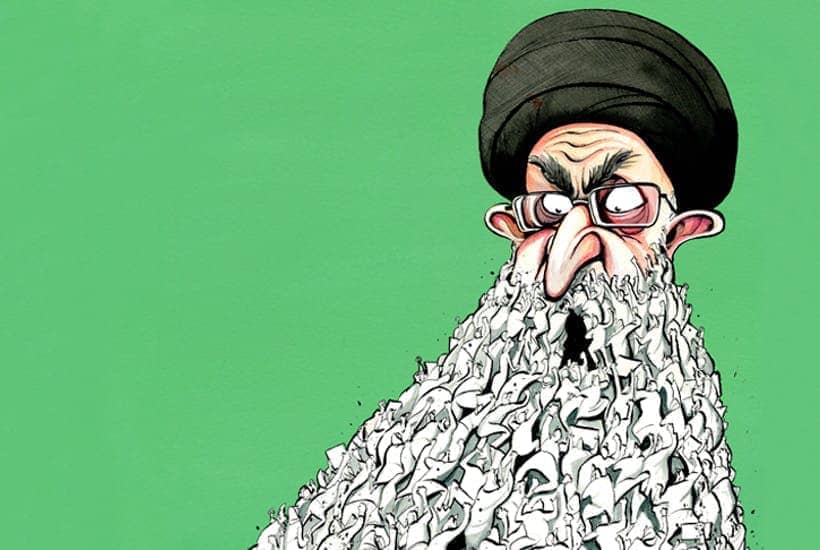Salman Rushdie’s would-be assassin might have been a lone wolf. He might have had no contact with military or intelligence figures. He might never even have set foot in Tehran. But be in no doubt: he acted, in effect, as an agent of the Islamic Republic of Iran. Under the terms of the fatwa issued by Ayatollah Khomeini in February 1989, Rushdie ‘and all those involved in its publication who were aware of its content, are sentenced to death’. Khomeini urged ‘brave Muslims to quickly kill them wherever they find them so that no one ever again would dare to insult the sanctities of Muslims’, adding: ‘Anyone killed while trying to execute Rushdie would, God willing, be a martyr.’
Western proponents of engagement with the Iranian regime like to quote the 1998 remarks of Kamal Kharrazi, the foreign minister of reformist president Mohammad Khatami. Kharrazi said then that the Khatami government would not ‘take any action whatsoever to threaten the life of the author of The Satanic Verses or anybody associated with his work, nor will it encourage or assist anybody to do so’. The Iran scholar Elton L. Daniel notes that Kharrazi’s statement was ‘accepted as sufficient for the United Kingdom to justify upgrading its relations with Iran’, but prominent religious and political office-holders continued to uphold the fatwa, including Tehran’s ambassador to London. Khatami’s reformism, modest though it was, has since been so thoroughly repudiated that it is forbidden for Iranian newspapers to publish his name or photograph.
Khomeini’s successor, Ali Khamenei, Iran’s current Supreme Leader, said at the time: ‘An arrow has been shot toward its target and it is now traveling towards its aim.’ In 2017, Khamenei confirmed the fatwa, saying, ‘The decree is as Imam Khomeini issued’, then two years later tweeted:
Imam Khomeini’s verdict regarding Salman Rushdie is based on divine verses and just like divine verses, it is solid and irrevocable.
Iran is a thug state, a rogue regime, a terror gang impersonating a government
While hardline Iranian newspapers have praised the attack on the 75-year-old novelist, the Iranian government has so far been silent. Why might that be? Might it be because Tehran is agonisingly close to reviving the Joint Comprehensive Plan of Action (JCPOA), the 2015 nuclear deal signed by Barack Obama but cancelled by Donald Trump. That agreement nominally stopped Tehran’s progress towards a nuclear bomb but really just slowed the process temporarily. Following further concessions proposed earlier this week by the EU (of course) that would lighten sanctions on Iran’s Islamic Revolutionary Guard Corps (IRGC), it looked like Iran could secure similarly favourable terms in the second incarnation of the JCPOA. The Biden administration is as ideologically committed to Iran Deal II as the Obama White House was to the original and Iran’s arrow finally reaching its target is unlikely to dissuade them.
It ought to. An American citizen has been the victim of an attempted assassination on American soil by, it appears, another American after decades of the Iranian Supreme Leader agitating for his murder. No country that is serious about its national security, to say nothing of its national self-worth, can pretend this is some everyday stabbing with no broader political implications.
Those implications relate not only to the attack on Rushdie. Earlier this week, the US Department of Justice charged a member of the IRGC – the lads the EU wants to go soft on – with conspiring to assassinate former White House National Security Adviser John Bolton. In July, a man armed with an AK-47 was arrested outside the Brooklyn home of Masih Alinejad, an Iranian dissident who was also the intended target of an abduction plot last year orchestrated by an Iranian intelligence agent.
The cumulative weight of these outrages should render the new Iran deal dead in the water. Making the Iranian regime suffer consequences for its actions in this way would not go down well with the Democrat or foreign policy establishments. The Europeans wouldn’t like it, either, and nor would the UK, which, inside or outside the EU, still seems incapable of devising a policy on the Middle East or western Asia that isn’t a faithful echo of the Brussels orthodoxy.
Iran is a thug state, a rogue regime, a terror gang impersonating a government. It is not someone we can do business with. The United States should cease its latest attempt to accommodate the nation-state of ‘Death to America’ and should focus its energies on supporting those forces in Iran – the young, the educated, the metropolitan – who want to topple the Islamic Republic in favour of a more democratic, more pro-western set-up. When these Iranians rose up courageously in 2009, the Obama administration’s response was tepid at best and helped stymie any momentum for political change. At some point, the United States has to stop rewarding its enemies and abandoning its friends.







Comments